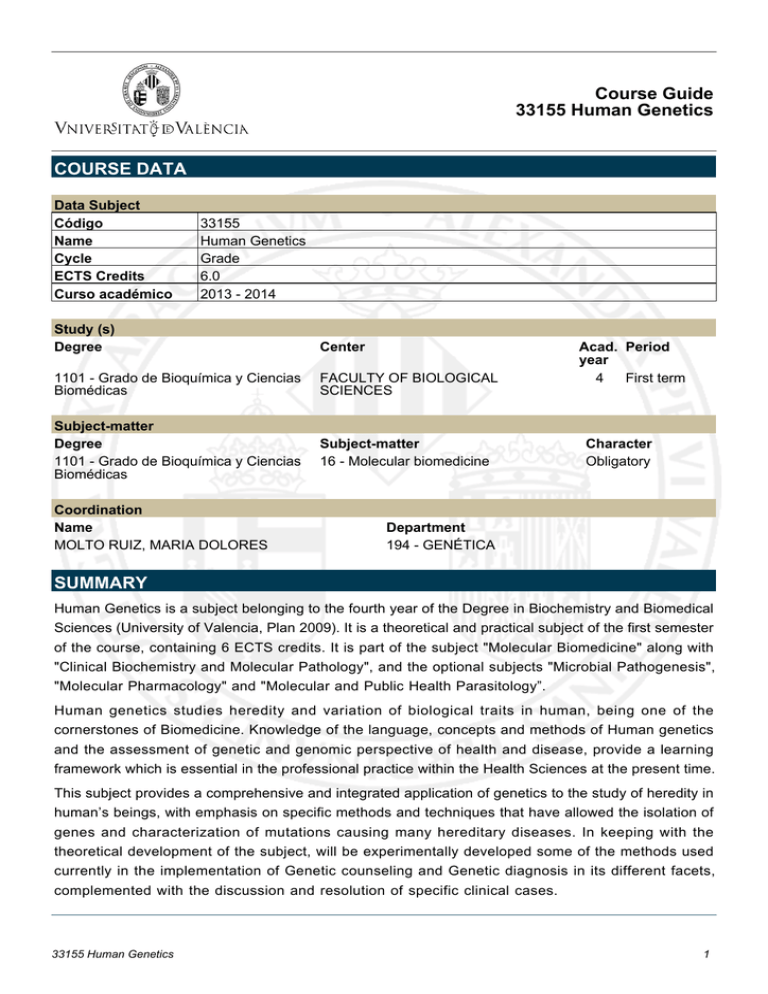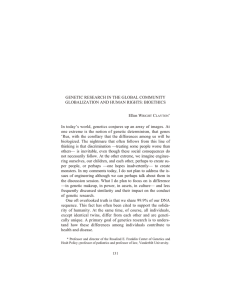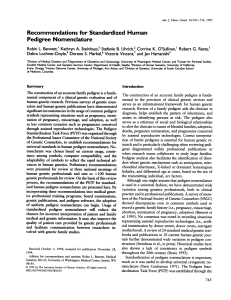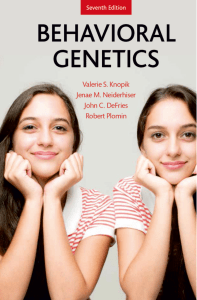Course Guide
Anuncio

Course Guide 33155 Human Genetics COURSE DATA Data Subject Código Name Cycle ECTS Credits Curso académico 33155 Human Genetics Grade 6.0 2013 - 2014 Study (s) Degree Center 1101 - Grado de Bioquímica y Ciencias Biomédicas FACULTY OF BIOLOGICAL SCIENCES Subject-matter Degree 1101 - Grado de Bioquímica y Ciencias Biomédicas Subject-matter 16 - Molecular biomedicine Coordination Name MOLTO RUIZ, MARIA DOLORES Acad. Period year 4 First term Character Obligatory Department 194 - GENÉTICA SUMMARY Human Genetics is a subject belonging to the fourth year of the Degree in Biochemistry and Biomedical Sciences (University of Valencia, Plan 2009). It is a theoretical and practical subject of the first semester of the course, containing 6 ECTS credits. It is part of the subject "Molecular Biomedicine" along with "Clinical Biochemistry and Molecular Pathology", and the optional subjects "Microbial Pathogenesis", "Molecular Pharmacology" and "Molecular and Public Health Parasitology”. Human genetics studies heredity and variation of biological traits in human, being one of the cornerstones of Biomedicine. Knowledge of the language, concepts and methods of Human genetics and the assessment of genetic and genomic perspective of health and disease, provide a learning framework which is essential in the professional practice within the Health Sciences at the present time. This subject provides a comprehensive and integrated application of genetics to the study of heredity in human’s beings, with emphasis on specific methods and techniques that have allowed the isolation of genes and characterization of mutations causing many hereditary diseases. In keeping with the theoretical development of the subject, will be experimentally developed some of the methods used currently in the implementation of Genetic counseling and Genetic diagnosis in its different facets, complemented with the discussion and resolution of specific clinical cases. 33155 Human Genetics 1 Course Guide 33155 Human Genetics PREVIOUS KNOWLEDGE Relationship to other subjects of the same degree There are no specified enrollment restrictions with other subjects of the curriculum. Other requirements OUTCOMES 1101 - Grado de Bioquímica y Ciencias Biomédicas - Capacidad de análisis, síntesis y razonamiento crítico en la aplicación del método científico. - Desarrollo de habilidades para la aplicación de los conocimientos adquiridos al mundo profesional. - Capacidad para el trabajo multidisciplinar en equipo y la cooperación. - Capacidad de utilizar las nuevas tecnologías de información y comunicación. - Saber utilizar las diferentes fuentes bibliográficas y bases de datos biológicos y usar las herramientas bioinformáticas. - Conocer los procedimientos habituales utilizados por los científicos en el área de las biociencias moleculares y la biomedicina para generar, transmitir y divulgar la información científica. - Conocer los elementos moleculares y celulares comunes y diferenciales de los diferentes tipos de organismos vivos con especial enfasis en el ser humano y organismos modelo para su estudio. - Comprender las aproximaciones experimentales y sus limitaciones así como interpretar resultados científicos en biociencias moleculares y biomedicina. - Saber diseñar estrategias experimentales multidisciplinares en el ámbito de las biociencias moleculares para la resolución de problemas biológicos complejos, especialmente los relacionados con salud humana. - Adquirir destrezas en el manejo de las metodologías empleadas en las biociencias moleculares y en el registro anotado de actividades. - Saber trabajar de manera responsable y rigurosa en el laboratorio, considerando los aspectos de seguridad en la experimentación así como los aspectos legales y prácticos sobre la manipulación y eliminación de residuos. - Conocer y comprender las bases moleculares de la información genética y los mecanismos de su transmisión y variación. - Conocer las aplicaciones de los conocimientos adquiridos en el diagnóstico, prevención y tratamiento de las enfermedades humanas. - Tener una visión integrada de las técnicas y métodos utilizados por las ciencias Biomédicas. - Capacidad para trabajar correctamente en los laboratorios de Biomedicina incluyendo seguridad, manipulación, eliminación de residuos y registro anotado de actividades. - Utilización de terminología específica de la biomedicina. - Conocer los principales métodos y técnicas experimentales aplicadas al estudio de la salud y enfermedad humanas, su etiología y la efectividad de los tratamientos. - Conocimiento de las enfermedades y disfunciones más frecuentes. - Capacidad para utilizar la instrumentación básica en los laboratorios de Biomedicina. - Diferenciar entre enfermedades cromosómicas, de transmisión mendeliana y multifactoriales. - Conocer las estrategias genéticas para la prevención de enfermedades hereditarias como son el consejo y el diagnóstico genético. - Conocer el papel de los genes en el cáncer y su seguimiento mediante marcadores tumorales. - Conocer los fundamentos de terapia génica. 33155 Human Genetics 2 Course Guide 33155 Human Genetics - Conocer las aplicaciones de los análisis genéticos en la identificación de individuos y la determinación de relaciones de parentesco. LEARNING OUTCOMES About knowledge 1. Knowing and applying correctly the vocabulary and terminology specific to Human Genetics. 2. Acquisition of essential knowledge about genetic and molecular bases of inherited diseases. 3. Acquisition of basic knowledge about the origin of karyotypic alterations and its application in clinical cytogenetics. 4. Acquisition of knowledge and its application about the methodology developed for identification of Mendelian genes and genetic risk factors in multifactorial diseases and cancer. 5. Acquisition of basic knowledge of strategies to address the prevention and treatment of genetic diseases. 6. Acquisition of knowledge about the genetic basis of interindividual differences in response to different drugs and its application in the context of personalized medicine. About procedure 7. Identification of the different Mendelian inheritance patterns, as well as the factors that can alter them, based on the study of genealogies and assignment of genotypes. 8. Assessment of genetic prediction and recurrence risk in hereditary diseases. 9. Recognition of loss of function vs gain of function mutations in hereditary diseases. 10. Learning the protocol for obtaining human karyotype and chromosomal abnormalities identification. 11. Learning different genotyping techniques as ASO (Allele Specific Oligonucleotide) hybridization. 12. Interpretation and presentation of genetic association studies results as "case-control". 13. Interpretation and presentation of genetic analysis results form different types of samples and tests applied in the genetic diagnosis. 14. Management of bibliographic sources related to human genetics from books, journals and database DESCRIPTION OF CONTENTS 1. Introduction The role of Human Genetics in Biomedicine and Health Sciences. Implications of the Human Genome Project. Genetic and hereditary diseases. 2. Human Karyotype 33155 Human Genetics 3 Course Guide 33155 Human Genetics The human chromosomes. Gametogenesis and mutagenesis. Karyotype abnormalities. The structural anomalies of autosomes. The numerical anomalies of autosomes. Uniparental disomy and diploidy. Major cytogenetic syndromes. 3. Sex chromosomes Dosage compensation. X-chromosome inactivation: molecular aspects. Abnormalities in the heterochromosomes. Fragile sites. Some errors in gonadal and sexual development. 4. The genetic and molecular bases of inherited diseases Mendelian inheritance. Human pedigree analysis. Autosomal inheritance. Sex linked inheritance. Loss and gain of function mutations. Rare diseases. Genetic prediction and risk of recurrence. 5. Extensions and exceptions to Mendelian inheritance Extensions to Mendelian inheritance. Penetrance. Expressivity. Genetic heterogeneity. Genetic anticipation. Pleiotropy. Genetic imprinting. Lethality. Mosaicism. Mitochondrial inheritance. 6. Genetic diseases with complex inheritance Continuous multifactorial inheritance. Discontinuous multifactorial inheritance. Genetic vulnerability factors. Familial clustering. Twin and adoption studies. Heritability. Congenital malformations. Multifactorial disorders of adult life. 7. Cloning disease genes Principles and strategies in identifying disease genes. Functional cloning. Candidate gene approaches. Positional cloning: cloning of chromosomal breakpoints, linkage analysis. Mutation screening: confirming a candidate gene. 8. Identification of genetic risk factors in complex diseases Linkage analyses in complex diseases. Linkage disequilibrium. Candidate gene association studies. Genome wide association studies (GWAS). Haplotype map: HapMap project. GxE association studies. 9. Biochemical genetics Inborn errors of metabolism. Hemoglobinopathies. Haemoglobin S and sickle cell disease Thalassemias. Genotype-Phenotype correlation. 10. Blood groups ABO system. Transfusion and incompatibilities. Rh system. Fetal erythroblastosis. MN system. Medicolegal applications 33155 Human Genetics 4 Course Guide 33155 Human Genetics 11. The genetics of cancer Genetic basis of cancer. Familial and sporadic cancer. Environmental risk factors. Oncogenes and tumor suppressor genes mutations. Tumor loss of heterozygosity. Alterations in DNA repair. Chromosomal instability. Tumor progresión. 12. Genetic counseling Genetic counseling. Determining recurrence risks. Genetic diagnosis: preimplantation, prenatal and presymptomatic. Diagnostics and laboratory tests. Population genetic screening. 13. Genetic diseases treatment Treatment strategies. Gene therapy: types. Therapeutic genes and constructs. Transfer vectors and methods. Candidate diseases. Applying genomics to individualize cancer therapy. Pharmacogenetics and personalized medicine. Ethical issues in human genetics. 14. Human Genetics Laboratory: Human karyotiping Extraction of 2 ml peripheral blood. Lymphocyte culture. Accumulation of cells in metaphase and dispersion of chromosomes. Fixing, extension and staining of samples. Observation by light microscopy and photography. Classification of chromosomes. 15. Human Genetics Laboratory: Detecting polymorphisms in alcoholism candidate genes using synthetic oligonucleotides. Genomic DNA isolation from blood cells. DNA amplification by PCR. Making a dot blot. ASO probe hybridization. Detection of hybrids by colorimetry WORKLOAD ACTIVITY Theory classes Laboratory practices Classroom practices TOTAL 33155 Human Genetics Hours 29.00 16.00 15.00 60.00 % To be attended 100 100 100 5 Course Guide 33155 Human Genetics TEACHING METHODOLOGY 1. Theory classes. A total of 23 one-hour sessions will be needed to cover this teaching activity, developed in the format of lectures. The teacher will present the most relevant contents for the subject, using audiovisual equipment for agile development. The material necessary for proper monitoring of the lectures will be previously available in Aula Virtual. 2. Laboratory. The program of laboratory classes will be developed in coordination with the lectures. The duration of each laboratory session is 3 hours. Attendance is compulsory for these classes. 3. Problems and questions. The concepts presented in the lectures will be reinforced in these sessions. Active participation of students through discussion and problem-solving will be stimulated. The teacher will prepare a series of exercises for each subject block taking into account the most relevant aspects of the agenda. Students will work individually (through personal preparation) and collectively (through exposure and discussion in the group class). 4. Seminars, conferences or other activities. Seminars will be held by researchers in molecular Biomedicine. Students will have the opportunity to make contact with current research on the subjects of their studies. The teacher will prepare a questionnaire relating to each of the seminars, so that students can demonstrate the interest and attention to these activities. Each student must attend and complete the questionnaire of three seminars. 5. Personalized tutoring. Students will be encouraged to use this resource for advice and discussion with the teacher of any topic about the program, the course, or degree studies. EVALUATION 1. Evaluation of the knowledge of theory and problems The concepts studied in the theoretical and problems sessions will be evaluated at the end of the semester by a written test. The value of this exam is 65% of the final grade for the subject. 2. Laboratory skills. It will be assessed taking into account the presentation of practical results and discussion (10% of final mark) and a written test (20% of final grade) to be held in conjunction with the previous exams. Attendance to the lab sessions is a prerequisite to pass the course. 3. Evaluation of the seminar. The mark obtained in this part will represent 5% of the qualification of the subject. The assessment of this activity will consider both the attendance and the ability to answer to questions concerning the contents of each seminar. The final grade is the sum of the grades achieved in the different sections. To pass the course is necessary to obtain an overall rating equal to or greater than 5 out of 10, taking into account that the note of the lab skills and theory-problems knowledge are either, independently, 4 or more out of 10. 33155 Human Genetics 6 Course Guide 33155 Human Genetics Second call: For students who have not passed the subject in the first call, the grades of the knowledge of theoryproblems and of the laboratory skills will be saved for the second call if the mark is equal to or greater than 4 out of 10. In these cases, students may waive their grade performing the corresponding exam in the second call. The grade obtained in the seminars is unique and will be saved for the second call. Students, who do not assist to any part of the final exam (theory or practice) and do not pass the course, will have NOT EVALUATED in the records. REFERENCES Basic - FRED B. Principles of Cancer Genetics. 2008. Springer Science+Business Media B.V. ISBN 978-14020-6783-9. - GARDNER and SUTHERLAND. Chromosome Abnormalities and Genetic Counseling. 2003 (3ªed) Oxford Monographs on Medical Genetics, Oxford University Press ISBN: 0195149602. - JORDE LB, CAREY JC y Bamshad MJ. Genética Médica. 2011 (4ª ed). Editorial Elsevier España SL. ISBN 978-84-8086-715-3. - LEWIS R. Human genetics: Concepts and applications. 2002 (5ª ed). McGraw-Hill. ISBN: 007246268X. - NOVO VILLAVERDE F.J. Genética humana: conceptos, mecanismos y aplicaciones de la genética en el campo de la biomedicina: texto multimedia. 2007. Diaz de Santos. ISBN: 978-84-832-2359-8. - NUSSBAUM R.L., McINNES R.R., WILLARD H.F. Genética en Medicina. 2008 (7ª Ed). Elsevier España. ISBN: 978-84-458-1225-9. - OMIM (Online Mendelian Inheritance In Man). Es un catálogo continuamente actualizado de los genes humanos y los trastornos genéticos. http://www.ncbi.nlm.nih.gov/entrez/Omim - PETER TURNPENNY. Emery, Elementos de Genética Médica. 2009 (13ª ed). Elsevier-Masson: Saunder, Mosby, Harcourt Brace. - STRACHAN and READ. Human Molecular Genetics. 2004 (3ª ed); 2010 (4ª ed, ISBN, 9780815341499) Garland Science/Taylor & Francis Group. La tercera edición tiene traducción al castellano (2006, Mc.Graw-Hill Interamericana, ISBN970-10-5135-1). - SOLARI A.J. Genética humana: fundamentos y aplicaciones en medicina. 2004. Editoral Diaz de Santos ISBN 978-84-7903-926-4. 33155 Human Genetics 7 Course Guide 33155 Human Genetics Additional - EuroGentest. Ofrece información sobre diagnóstico y consejo genético. http://www.eurogentest.org/web/index.xhtml. - JOBLING, HURLES, TYLER-SMITH. Human Evolutionary Genetics: Origins, Peoples & Disease. 2003 Garland Science/Taylor & Francis Group. ISBN: 0815341857. - NCBI (National Center for Biotechnology Information) - Base de datos de citas y resúmenes de la literatura biomédica de MEDLINE y revistas de ciencias de la vida adicionales: http://www.ncbi.nlm.nih.gov/pubmed/ - Relación de libros electrónicos sobre temas de biomedicina: http://www.ncbi.nlm.nih.gov/books/ - Orphanet. Portal de información europeo de referencia en enfermedades raras y medicamentos huérfanos. http://www.orpha.net/consor/cgi-bin/index.php - SCRIVER, A.L., BEAUDET, W.S. SLY and D.VALLE (eds). The metabolic and molecular bases of inherited disease, (8ª ed) 2001. McGraw-Hill. 33155 Human Genetics 8



